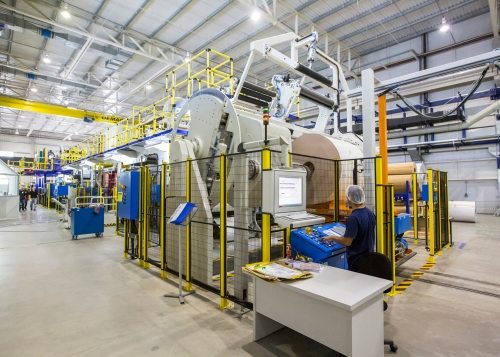An extrusion line at SIG Combibloc’s Brazilian packaging plant is now laminating unprocessed cardboard for the company’s carton packs on-site.
This milestone completes the modular investment and building project in Campo Largo, near the city of Curitiba in Brazil’s Paraná state, says the company.
The first rolls of packaging material are already rolling off the belt fully laminated.
The starting signal for this ambitious building project in Brazil was given in 2010, when SIG Combibloc began construction of its first packaging plant in South America.
The packaging plant began operations in mid-2011.
With the production line installed, the prelaminated packaging material used to make the carton packs was printed, cut to size, stamped and sealed.
In the second stage of construction, an extrusion line has now been added, which from now on will laminate the unprocessed cardboard with polymers and aluminum on-site in Brazil.
The inner polymer layers of an aseptic carton pack form a liquid barrier for the products that will later be filled in it; the outer layer keeps moisture out.
The razor-thin aluminum layer protects the food and beverages packaged in the carton packs from light, oxygen and external odors.
Optimally prepared
“With this fresh major investment of about €40 million (US$53.72 million) for the installation of the extrusion line, we have laid the groundwork to be optimally prepared to meet the everincreasing demand for aseptic carton packs,” says Ricardo Rodriguez, director and GM South America.
“We can now produce the packaging material needed for our carton packs in South America, on-site in Brazil. The extrusion line will laminate around 250 million metres of packaging material each year”.
Brazil is currently South America’s biggest market for long-life beverages and foods in aseptic carton packs; and world-wide too.
The country’s demand for carton packs puts it in second place, behind China.
According to estimates by Canadean, the sales of aseptic carton packs totaled more than 14 billion units in Brazil in 2013.
Forecasts suggest this will climb to 21 billion carton packs by 2019 – equivalent to a further increase of about 7% per annum.










